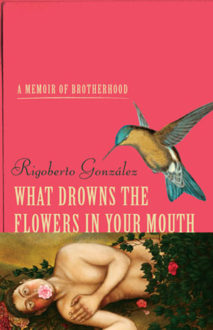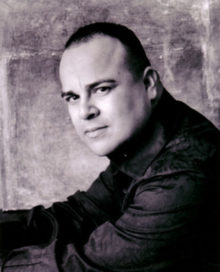 What Drowns the Flowers in Your Mouth
What Drowns the Flowers in Your Mouth
by Rigoberto González
Published by University of Wisconsin Press
Living Out series: Gay and Lesbian Autobiography
Published March 13, 2018
History (autobiography)
208 pgs. • Find on Amazon.com • WorldCat
Reviewed by Stephen O. Murray
May 21, 2018
I admire Rigoberto González’s (henceforth R) prose in What Drowns the Flowers in Your Mouth.
I didn’t remember how much about the father who left when R was 13 and the mother who died when he was 11 appeared in Butterfly Boy (2011), which I also admired. There is an ogre of a paternal grandfather as well as the father who is a drunkard trying to cadge money from his sons, Rigoberto, who visits from NYC and his younger brother, Alex, who lives next door. (He fled to NYC “in 1998 when the thought of living close to my family filled me with anxiety because I couldn’t reconcile my college years as an out gay youth with my family’s don’t-ask-don’t-tell policy.”)
When finally he comes out to Alex, his brother tells Rigoberto that he has known for years, though there is also a will not to know passage: “Azucena [a slattern earlier companion to Alex] had seen in me what my father and grandparents and even by brother had refused to see or name.” (76). Surprisingly his father does not try to use R’s “deviance” against him, though not wanting non-kin to know about it . (But the Gonzálezes live close together near Mexacali, so how many non-kin did the father interact with?)
R gives no quarter to the paternal grandfather who took him and his brother in when they were growing up (other relatives were willing to take only R, but even when they were not getting along well together, would not consider being separated from Alex). R eventually manages some sympathy for his father, after nurturing resentment approaching fury for decades: not enough to go see him in a coma, but some.

Though feeling estranged by what he thought was the secret of his sexual orientation, there is nothing beyond mention of their number about his partners, except for one man as abusive as his grandfather had been, and I’d say even more egotistical than the abuelo.
This is primarily a memoir of the strong fraternal bond, not one of being abused as Butterfly Boy was. Both books, published in the University of Wisconsin’s estimable “Living Out” series, show someone “living out” despite reluctance for his not-so-secret secret to be known by his immediate family.
I found both books moving. Both recall considerable suffering of losing both parents (only the mother through death) and being raised by a man I have already characterized as an “ogre.”
There is, again a lot of crossing of the Mexico/U.S. border. Both Rigoberto and Alex were born in the U.S. (R in Bakersfield, CA in 1970, Alex four years later), so the crossings are less fraught than those of family members born in Mexico.
And the author knew hunger and poverty on both sides of the border.
(The title comes from a line of a poem by Pablo Neruda, “The light of June drowned the flowers in your mouth.”)
©20 May 2018, Stephen O. Murray

